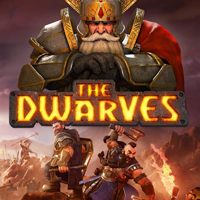The Dwarves Review – shoddy dwarven craftsmanship
We’ve been keeping a close eye on King Art Games ever since Jakub Rozalski decided to entrust them with the development of Iron Harvest. The Dwarves can be seen as an exam of the studio’s capabilities. The results, however, are less than promising...
The review is based on the PC version. It's also relevant to PS4, XONE version(s).
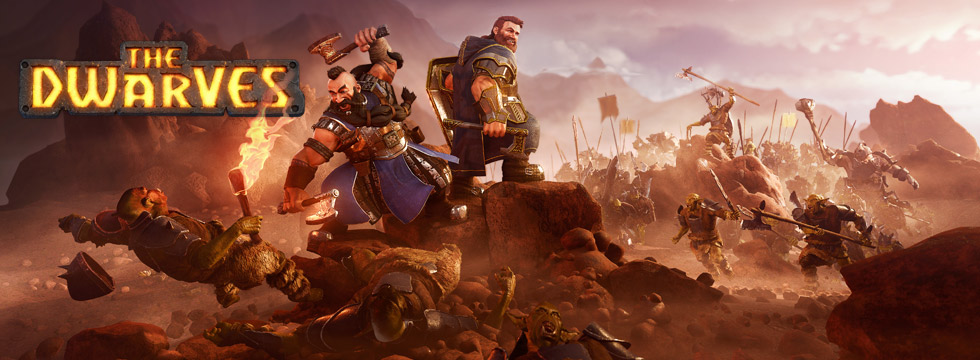
- Fans of either dwarves (the race) or Dwarves (the books) should be satisfied;
- Gamebook-like traveling around the world map and exploration are climatic and can be really entertaining;
- Interesting execution of the narrative, nicely written and acted dialogues;
- Assuming you get a glitch-free encounter, combat is somewhat satisfying;
- Decent audiovisuals with nice cut-scenes and music by Blind Guardian.
- Half-baked combat – chaotic, illegible, with poor physics, dumb AI and a ton of glitches;
- Cliched, trivial tale for less than 10 hours, devoid of any significant choices;
- Cookie-cutter fantasy world in which there is almost nothing to do;
- Primitive RPG layer;
- Awkward controls, which can’t be freely configured;
- Lack of stability (occasional crashes).
As a lover of fantasy literature, I sympathize with the Germans. While Polish players can boast the Witcher saga written by Andrzej Sapkowski and its excellent video game adaptation by CD Projekt RED, their Western neighbors only recently got anything similar... Assuming we consider as such a book that gives off the impression of being a Tolkien-ripoff (I’m talking about The Dwarves by Markus Heitz), and its digital adaptation that looks like a budget version of Dragon Age: Origins. Studio King Art Games has created an RPG with a potential – unfortunately, this potential was almost completely wasted. That's hardy a reason to recommend this game to anyone.
Dwarven Age: Origins?
Where's the connection with the first Dragon Age? First, the outline of the whole story. If it weren’t for the fact that the books were written a few years before the release of DA:O, I might've been suspicious when reading the story of a young dwarven blacksmith, on whom, by a whim of fate, falls the task of uniting his kinsmen, as well as humans and elves, to fight the great evil, represented here by a sorcerer leading an army of orcs, undead, and dark elves (known as the elfr). This, of course, is a plot premise known in the fantasy genre for centuries, but it’s also a very popular theme which happens to marry heroic pathos, a dose of dark brutality, and a tint of crude humor, all in all reminiscent of the work by BioWare.
The second thing that brings to mind Dragon Age: Origins, are the mechanics. The Dwarves i salso a tactical RPG in which we lead a team of four adventurers into battle. The key to success lies in planning our actions on active pause and employing the special abilities of our heroes. This is where the similarities end, though, because in the work from King Art Games, beside fighting, we spend a lot of time on traversing the world gamebook-style.
Jumping through the lands
Traveling is the first aspect of the game I'd like to discuss, before I proceed to dissecting the combat system. Exploration of the world of Girdlegard is the greatest strength of The Dwarves. Moving the pawn on a map covered by a dense network of routes can really suck you in, and it has the oldschool charm of a classic fantasy adventure. The journey is full of regularly occurring events to which we must respond – the list includes e.g. interactions between party members, terrain obstacles, or encounters with mysterious strangers. The real fun begins, though, when we learn that a wrong decision can have fatal consequences.
Unfortunately, the spell is broken as soon as we discover that the world is only made to look as if it were filled with attractions. As long as we stick to the path leading to the main objective, we will experience interesting adventures by the bushel, but if we decide to traverse the peripheral roads, we will find almost nothing. The number of random encounters waiting for us in most villages and towns is usually limited to one (being a visit to the local trader), and we can count all the side quests on the fingers of your hands. Worse, the story itself is linear and the occasional choices have virtually no impact on the course or even on the ending of the story. Adding insult to injury, experienced players will be able to see said ending in less than 10 hours, and even those most inquisitive will reach it in no more than 15.
Cliché intensifies
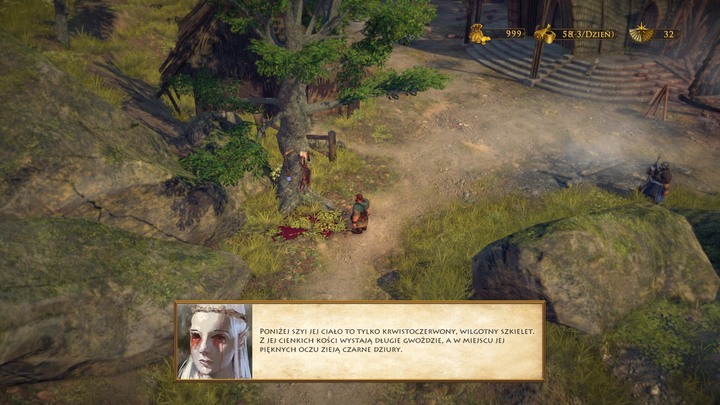
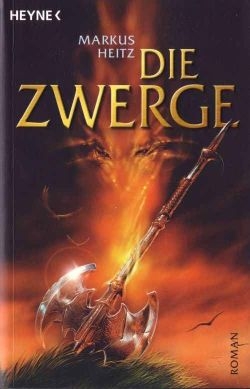
The game is based on a novel entitled The Dwarves – a 2003 German bestseller opening a five-volume series written by Markus Heitz. The game is a relatively faithful (albeit abridged) digital adaptation of the novel.
Still, even that very short campaign has its advantages. Apart from the fact that we spend less time having to deal with the game mechanics (more on that shortly), it means a more concise and exciting composition of the plot. Although searching for something notably inventive and engaging in this game, whether in the setting or in the narrative, is a futile task, thanks to the numerous plot twists, it’s surprisingly nice to see the plot unravel. It is also thanks to some very nice cut-scenes, which were clearly made by adventure game specialists (it was also King Art Games' main trade until recently), as well as decently recorded dialogues and interesting narrative model, relying on lines spoken by the characters mixed with descriptions read by the narrator.
What else can we find on the less-than-charming side of the narrative layer? I'd say the characters. This applies particularly to the main character, Tungdil – he's a dwarf with a heart of gold instead of character depth, and his passions focus on books rather than axes, beer and gold. The remaining dozen or so of his companions, mostly belonging to the same race (ain't that a surprise in a game called The Dwarves...), are much more "worthy" representatives of his kin. The party also includes a haughty sorceress with a golem, and an acting troupe that loves to fool around. While individual characters are easy to like (or dislike), overall there's too many of them; as a result, the screen time is spread too thin for us to establish any kind of deeper emotional bond with any of the characters.
Disgraceful retreat from the battlefield
The early ending brings joy especially if we take into account the simplicity – or rather crudeness – of the RPG mechanics in this game. The whole character progression comes down to selecting one of the two skills available every two levels (with the level cap being 10). Also the inventory management has been brought down to a minimum – the most we can get are potions and amulets, which can be equipped for the duration of combat (one item per character). Are those guys serious? To be honest, we could try to justify this by indicating that the team can have as many as twelve characters at once... but compared to other RPGs it's a rather unconvincing excuse.
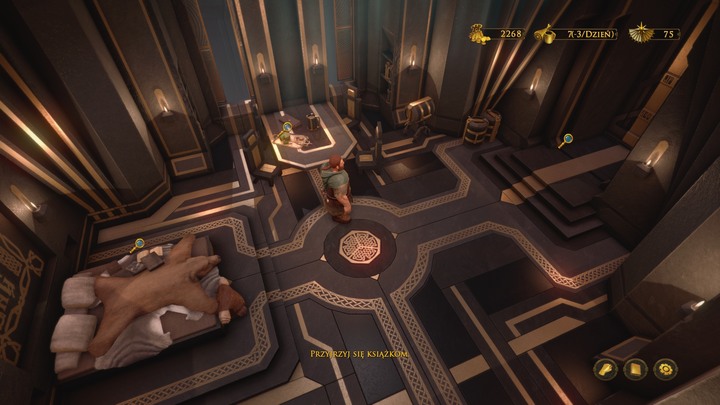
Ok, what is wrong with the combat system then? It's completely amiss, starting with its very premise. Don't be fooled by the advertising slogans – you wouldn't mistake The Dwarves for a tactical RPG even if you were blind. What we get here is a crossbreed between the aforementioned Dragon Age: Origins and a hack'n'slash – a chaotic brawl involving dozens of enemies, which can be paused only to use one of as few as three special abilities or a single item. And that's it – forget about choosing a formation for the party or determining the behavior of each character (e.g. aggressive or defensive).
Perhaps the biggest disappointment is the pompously advertised use of physics in combat. Admittedly, our attacks frequently result in pushing away, knocking down or scattering groups of enemies, but pushing a mere goblin into the abyss gaping two meters next to it requires persistance worthy of a better couse. Bodies of opponents display much less inertia than they should when hit by our attacks. And by the way, the "physics" used in this game can also lead to bizarre situations, such as party characters tripping on obstacles or mutually knocking themselves down when running in a tight formation to join a fight. Fortunately, this happens very rarely.
My friend, the dwarf
Combat could've been enjoyable even without much tactical depth, if not for the utter lack of polish that characterizes this element of the game. The worst is probably the illegibility of the battlefield – when zoomed out, the silhouette of the enemies often blend with the surroundings, and there's no option to highlight the characters on the screen. One more issue is the fact that it can be difficult to "lock on" to a specific character (despite hovering the cursor right over it), and cases when the camera refuses to budge. In addition, frequent pausing is needed not only in order to accurately aim our attacks (trying not to hit allies in the process), but mainly because of the incompetent AI of our party.
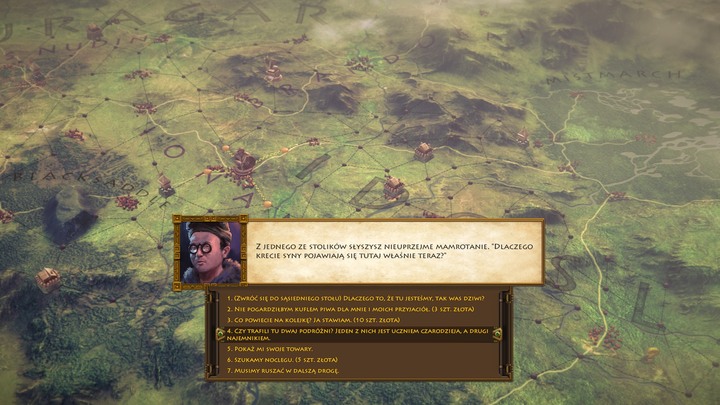
The characters can get stuck on the tiniest of obstacles, and if left alone for a few seconds they will remain perfectly still, even if there's a battle raging right in front of them. The enemies are no better – they attack in a swarm, without any tactics, except maybe relying on infinite respawns (until the player completes some specific objectives), and totally do not mind the fact that they are e.g. entering a cloud of poisonous gas. And then there's the truckload of bugs and glitches. The only playable character with a ranged weapon uses it at point-blank range, large healing potions have no effect, the special attacks take the hit-or-miss policy literally – and even if the attack hits, sometimes it won't work (despite having consumed action points), and sometimes the cooldown timer will freeze, effectively locking down the ability.
Fortunately, combat is not the dominant element of the gameplay in The Dwarves, and thanks to diversified battle scenarios and decent level of difficulty, there is some satisfaction to be gained from victories (assuming the glitch concentration in a given battle hasn't reached a critical level). A handful of patches may perhaps significantly improve the situation, but for the battles to be as fun as they were advertised to be, you would probably have to re-code the entire game...
Blessing of the Blind Guardian
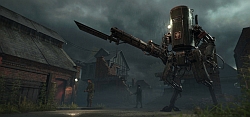
What does The Dwarves tell us about the current capabilities of King Art Games, the studio to be responsible for the development of Iron Harvest – the highly-anticipated RTS set in the 1920+ universe created by painter Jakub Rozalski? Judging by the quality of their latest game, we're not exactly optimistic. While it's hard to deny the developers certain creativity, the game mechanics and technical refinement sometimes cry out to heaven for vengeance. Let's hope that by 2018 the developers will have significantly improved their skills.
Finally, I have a few good words left to say about the audiovisual layer and some bittersweet about the technical side of the game. The former presents a decent level – maybe not impressive but not repelling either. The three-dimensional map of the world and some animations (especially in the aforementioned cut-scenes) are great, though the models of environmental objects and characters fall a bit short. The music can only be described as acceptable, even though the overall value of the soundtrack was raises significantly by the addition of a promotional song by the heavy meatal band Blind Guardian (the band has also a small guest appearance in one of the quests).
I have no complaints regarding the optimization. A computer equipped with Core i5-4570 (3.2 GHz), 8 GB of RAM and a GeForce 1060 GTX ensured a steady 60 fps at the highest visual settings and in 1080p (although there were a few cases when it dropped to approx. 40 fps). The game settings, however, are yet another drawback, because the developer has provided very little configuration options – you can't even customize the controls (and the game could sure use this option, because the default button mapping is not very comfortable). Yet another problem is the fact that the game likes to occasionally crash to desktop for no apparent reason.
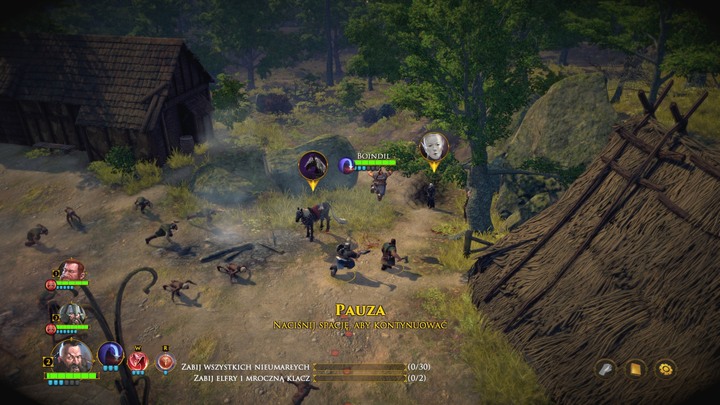
May your iron harvest be bountiful!
In summary, The Dwarves is not a bad game, but, as I mentioned in the introduction, it's hard to sincerely recommend it to anyone. If you are looking for tactical combat served in fantasy sauce you'd be better off picking up the recent Tyranny or literally any installment of the Dragon Age series. Equally (if not more) distinct atmosphere of an old-school adventure in a fantasy world, but with richer options to play the role of a proud dwarf, can be found in the much underappreciated Baldur's Gate: Siege of Dragonspear. And the true joy of wiping the floor with hordes of monsters on the battlefield – in any half-decent hack'n'slash. Or in Warhammer: The End Times – Vermintide.
Admittedly, The Dwarves includes some original solutions and can be actually entertaining, but it is often laughter through tears – the joy of adventuring is sooner or later destroyed by broken combat or the awareness that there's very little to do in this virtual world. And even if the narrative or the characters would happen to captivate you, making up for all the mechanical shortcomings, after all is said and done you will be disappointed with how quickly the adventure comes to an end. You can take a chance by joining the expedition of The Dwarves if you ran out of really good RPGs... but wait at least until the price drops and the developers properly patch their work. At the moment, there are one hundred better ways to invest EUR 40 than buying The Dwarves.
DISCLAIMER
I've played The Dwarves for approx. 13 hours, completing the main story, and dealing with as many side quests as I could find (which, as I've already said, are not exactly numerous). I've also spent some time roaming the world, trying to find different ways to reach the goals.
The Dwarves
The Dwarves Review – shoddy dwarven craftsmanship
We’ve been keeping a close eye on King Art Games ever since Jakub Rozalski decided to entrust them with the development of Iron Harvest. The Dwarves can be seen as an exam of the studio’s capabilities. The results, however, are less than promising...

